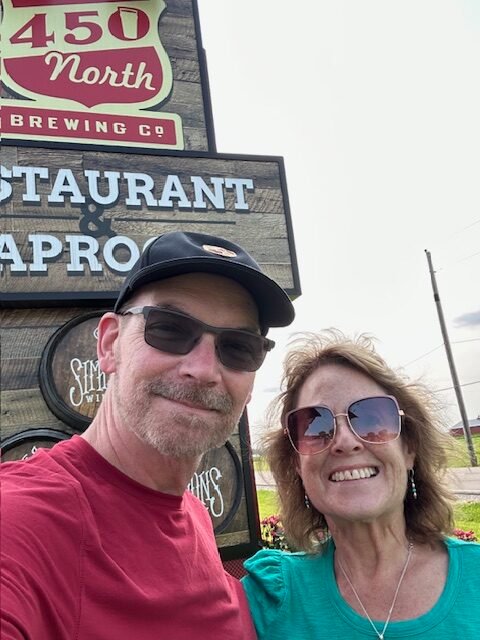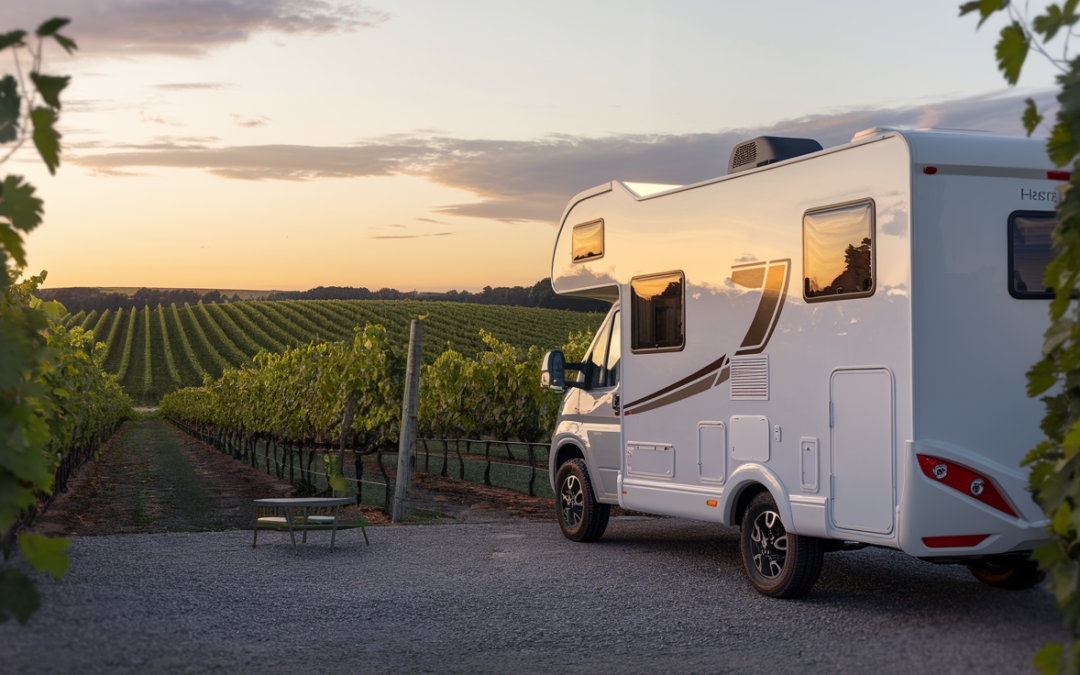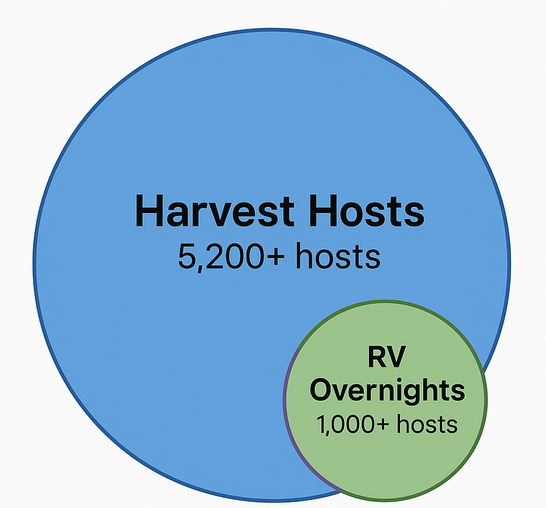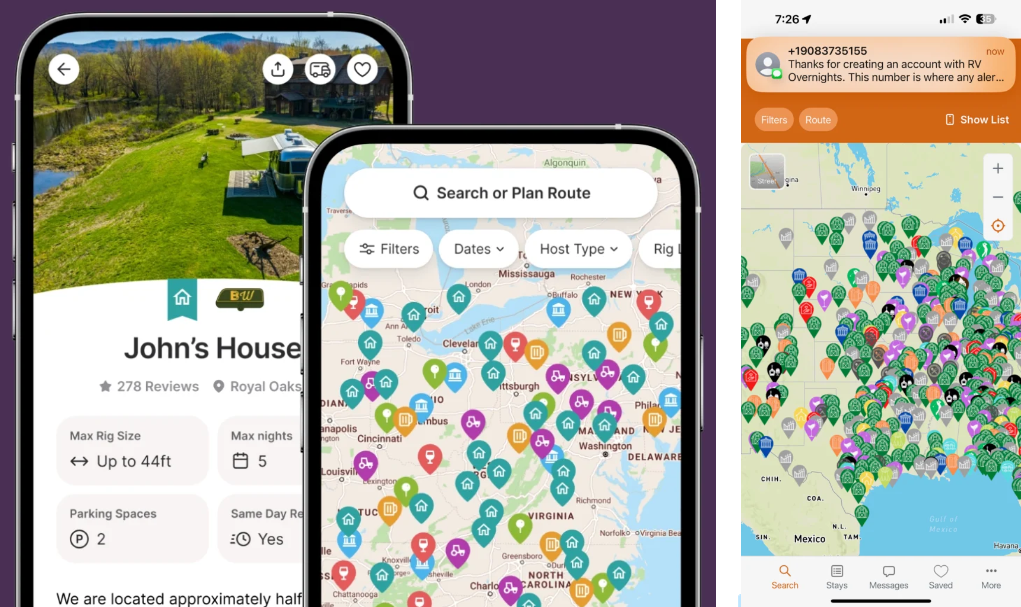Breakdown of Costs, Locations & Real Value
By Chuck Price – Last updated – ~12-minute read (3386 words)
1. Membership Basics and Terms
Both programs promise free overnight parking, but their approaches differ in some ways:
- Harvest Hosts, founded in 2010 and acquired by Joel Holland in 2018, partners with wineries, breweries, farms, museums, golf courses, and other attractions to offer unique overnight stays for self-contained RVers. The company has grown from a mom-and-pop operation to a team of over 50 employees serving more than 250,000 members. Stays are typically one night, without hookups, and guests are encouraged to support their hosts with a purchase of around $ 30. Membership tiers include Classic ($ 99/year) and All-Access ($ 179/year, which adds access to golf courses and Boondockers Welcome locations).
- RV Overnights, launched in 2024, connects RV travelers with a wide range of small business hosts—such as farms, wineries, and restaurants—offering overnight parking. Its primary focus is on small businesses and non-profits. Most stays are at transit stops where guests are encouraged, but not required, to support hosts through optional purchases of around $ 30. Membership is available in a single tier for $ 49.99 per year, featuring a lifetime price-lock for early members and a 90-day money-back guarantee.

RVO publicly previews its map before you pay—rare transparency in the membership world.
2. Real Cost of Ownership (Including Hidden Fees)
| Cost Item | RV Overnights | Harvest Hosts (All-Access) |
|---|---|---|
| Annual Fee (standard) | $ 49.99 | $ 99 – $ 179 |
| Courtesy Spend per Stay | ~$ 30 expected | ~$ 30 expected |
| Average Hookup Fee | $ 0 or $ 10 when offered | $ 0–$ 20 (rare) |
| Refund Policy | 90-day money-back guarantee | 3-month “Happy Camper” policy |
When you factor in the expected courtesy spend, a 10-stay season with Harvest Hosts All-Access could total $ 379–$ 479 (annual fee plus host purchases), while RV Overnights would cost about $ 230–$ 330 for the same number of stays. Both options are typically less expensive than commercial campgrounds, but the real cash outlay—including purchases at host businesses—is an important consideration for new members.
3. Host Network Density and Coverage Maps
Network size matters—but only where you travel. As of July 14, 2025:
- Harvest Hosts (HH): 5,200+ total hosts with locations across North America, including 730 in Canada and 78 in Alaska. The network features farms, wineries, breweries, distilleries, and attractions, plus access to 7,000+ dump stations and robust route planning tools.
- RV Overnights (RVO): 1,069 hosts, with the greatest density east of the Mississippi River. Many RVO locations are transit-oriented, with a smaller and more regionally concentrated network.
The number of available locations along any route will vary. Harvest Hosts generally offers a broader nationwide network, while RV Overnights provides fewer options. For specific trip planning, members should use each platform’s interactive map and route planner or RVO map to check host availability along their intended path.
4. Amenities, Hookups, & Rig Limits
RV Overnights — Strengths
- Some hosts provide 15–50 A electric hookups for a fee—helpful for charging batteries or running A/C.
- Big-rig friendly: 77% of locations accept rigs 45 ft or longer (filterable with the #BigRig hashtag).
- 73% allow multi-night stays, ideal for slower travel or weather delays.
- Live map layers (BLM, weather, wildfire, carrier-specific cell coverage) allow you to research stops in one place.
- Human phone support seven days a week—useful if Wi-Fi is unreliable.
- Built-in trip planner with host-response times.
Harvest Hosts — Strengths
- 5,000+ locations including farms, wineries, breweries, golf courses, and attractions.
- 280,000+ member reviews and 330,000+ photos for researching stays.
- Built-in route planner with host-response times.
- $ 2,000+ in partner discounts (Good Sam, AllTrails, Goodyear, EcoFlow, and more).
- Dedicated support team via chat and email.
RV Overnights — Considerations
- The host network is smaller (≈1,000) than Harvest Hosts; availability may be limited in remote regions.
- Hookups cost extra but are easy to reserve in advance: most hosts list availability and pricing in the marketplace, and you can add them to your booking when you request an overnight stay.
Harvest Hosts — Considerations
- Many hosts cap length at 40 ft (combined RV + tow), limiting options for large Class A and fifth-wheel rigs.
- Nearly all locations are dry-camp only—arrive with full fresh tanks and empty waste tanks.
- Popular wineries and farms may host multiple rigs on busy weekends, reducing privacy.
RV Overnights — Tech Highlights
- Smart filters and searchable hashtags (e.g., #Waterfront, #CowCuddling) let you zero-in on exactly the stays you want.
- Public-land overlays surface nearby BLM and USFS boondocking spots in seconds.
- Cell-coverage layers, live weather overlays, and a 7-day forecast on every host profile—powered by an exclusive partnership with RV Weather—keep travel surprises to a minimum.
- Extensive RV-service pins (dump stations, propane, towing, repairs) are built into the same map, so no extra apps required.
- Industry-first host-response-time stats help you gauge how quickly a host is likely to approve your stay
Harvest Hosts — Tech Highlights
- Cell-coverage layers (Verizon, AT&T, T-Mobile, US Cellular) plus live weather overlays.
- Route-planning tools with integrated host-response-time display.
RV Overnights — Member Benefits
- Lifetime price-lock ($49.99/yr) and 90-day money-back guarantee.
- Real-human phone support 7 days a week.
- Introductory promo code for new members (subject to change).
Harvest Hosts — Member Benefits
- $ 2,000+ in partner discounts and special offers.
- Large, active community with 1M+ approved stay requests.
RV Overnights appeals to budget-minded travelers who value robust filtering, live map data, and big-rig flexibility. Harvest Hosts excels at immersive, experience-driven stays with the largest host network—though most sites are dry camping and have stricter length limits. Choose the platform that best fits your rig, travel style, and hookup needs.
Citations:
RVOvernights: A New Overnight Stay Option for RVers (Camper Report)
RV Overnights Review: RV Overnights Reviews & Complaints (Boondock or Bust)
Harvest Hosts official website and blog
5. Booking Workflow and App Technology
Harvest Hosts (HH) has perfected its technology stack: 4.6★ on Android (15k+ reviews), 4.9★ on iOS (53k+ ratings). In-app messaging, offline saving, weather overlays, and guest reviews make same-day booking straightforward. Advanced filtering includes rig length, host type, electric hookups, pets allowed, and separate tow vehicle parking.
Harvest Hosts (left) has a more mature app, while RV Overnights (right) offers unique map overlays.
Conversely, RV Overnights (RVO)‘s Android app sits at 3.0★ (26 reviews) with occasional frozen map tiles; iOS performs better at 3.9★ (34 ratings). However, July’s v1.6 update improved cache speed by 40%.
6. What 2,000+ Users Really Say
We mined ≈1,500 public app-store reviews and read every comment in the 2025 Facebook and Reddit threads you shared. Below is a balanced sample of the most-liked remarks—shown exactly as written, warts and all.
Harvest Hosts (HH)
❤️ Fans rave about the experiences (6 examples)
Staying at a Harvest Host now. 1st time. Loved it.
— Richard Cross, Facebook group comment (11 w ago)
It’s been absolutely worth it! … We’ve never been disappointed.
— Deborah Christianson, Facebook (11 w ago)
We used Harvest Host on our 8,000-mile trip out west … Everywhere, the hosts were extremely nice!!
— Debbie Button-Wells, Facebook (11 w ago)
Love Harvest Hosts! We have stayed at farms, wineries, breweries, a drive-in movie theater and an alpaca farm!
— Faith Hernandez Skinner, Facebook (11 w ago)
We LOVE Harvest Hosts! … Just stayed at a decommissioned Atlas Missile Base in Kansas—most eclectic stop ever.
— u/gaymersky, Reddit r/GoRVing (Apr 2025)
The real value is in the Boondockers Welcome part of the membership. Free stays and it’s usually quick and easy to find a spot at the last minute.
— u/Standard-Cactus, Reddit r/GoRVing (Apr 2025)
⚠️ Common gripes (6 examples)
We have used HH a few times. It’s not a “free” overnight. After the membership fee you’re still expected to spend $ 30. … We are not renewing.
— Loralee Jeter, Facebook (11 w ago)
A lot of these places are closed Mondays, or they’re booked already. Frequently they are too far off our route. Some charge a fee for electricity.
— Mike Little, Facebook (11 w ago)
Had a membership for 2 years. Never stayed … Waste of money.
— Connie An Norm, Facebook (11 w ago)
Now you have to make reservations??? As far out as a month or more. … It’s parking in a parking lot 90% of the time.
— Scott Reiner, Facebook (11 w ago)
Price has gotten awfully high. Yearly fee keeps rising without adding a lot of actual benefits.
— u/PhilAndHisGrill, Reddit (Apr 2025)
It’s only good for overnight stops … have to show up before the business closes at 5 PM, so usefulness is pretty limited.
— u/Thurwell, Reddit (Apr 2025)
RV Overnights (RVO)
👍 Positive notes (2 examples)
RVOvernights is legit. The filters make it easy to find the right place—I’d highly recommend.
— u/Ok_Conference_3921, Reddit (Feb 2024)
$ 49 pays for itself in one electric-hookup night.
— VanLifeSteve, Google Play review (Aug 2024)
👎 Negative notes (2 examples)
Great idea, but 10 of the 30 hosts on our Oregon loop were duplicates from HH.
— RVGal, Google Play review (Jan 2025)
We got both and did not use RVOvernight once in a year. Either we didn’t fit or they were not accepting or just did not respond.
— Cory LaJoie, Facebook (11 w ago)
Key takeaway: HH wins on host count and “wow-factor” stays, but many full-timers balk at the rising cost and reservation friction. RVO’s bargain price appeals to budget travelers—yet the smaller network means occasional dead ends.
7. Cost-Saving Scenarios: How the Memberships Pay Off
These examples break down how a strategic approach to overnight stays can lead to significant savings. The key is to account for all costs, including membership fees and the recommended host support.
7.1 The Weekend Warrior (Albany → Adirondacks Loop, 3 nights)
- Conventional Cost: Private campgrounds in the region average $ 50 per night (≈$ 150 total).
- Harvest Hosts Route:
- Membership: $ 99 (Harvest Hosts Classic)
- Camping Fees: $ 0
- Host Support: 3 stays x $ 30 recommended spend = $ 90
- Total Out-of-Pocket: $ 189
- Net Savings: You’d spend an additional $ 39 compared to conventional camping for this single trip. However, this trip utilizes the Harvest Hosts membership, which can be leveraged for future savings throughout the year, making it a worthwhile investment for ongoing travel.
7.2 The Snowbird Run (Albany → Gulf Coast, 42 nights round-trip)
- Conventional Cost: Mid-range RV parks in the Southeast average $ 65 per night (≈$ 2,730 for 42 nights).
- Hybrid Strategy: 26 nights with Harvest Hosts, 10 with RV Overnights, and 6 in Florida State Parks ($ 42/night).
- Out-of-Pocket Breakdown:
- Memberships: $ 99 (HH) + $ 49.99 (RVO) = $ 148.99
- HH Stays: 26 nights x $ 30 avg. spend = $ 780
- RVO Stays: 10 nights x $ 30 avg. spend = $ 300
- State Parks: 6 nights x $ 42 = $ 252
- Total Out-of-Pocket: ≈$ 1,480.99
- Net Savings: ≈$ 1,249 vs. staying exclusively in commercial RV parks.
7.3 The Full-Timer Benchmark (198 Nights)
This scenario is recalculated to properly reflect the host support costs, providing a more realistic annual budget.
- Lodging Breakdown:
- 54% free public land (107 nights)
- 26% Harvest Hosts (51 nights)
- 12% RV Overnights (24 nights)
- 8% commercial parks (16 nights)
- Annual Lodging Spend Calculation:
- Memberships (HH + RVO): $ 99 + $ 49.99 = $ 148.99
- Harvest Hosts Support: 51 nights x $ 30/night = $ 1,530
- RV Overnights Support: 24 nights x $ 30/night = $ 720
- Commercial Parks: 16 nights x $ 65/night = $ 1,040
- Total Annual Spend: ≈$ 3,438.99
- Financial Insight: This strategic approach keeps the total lodging spend well below the typical full-timer average, which often exceeds $ 7,000. The combined memberships pay for themselves within the first week of use.
Tip: In 2025, Harvest Hosts All Access ($ 179/year) bundles Boondockers Welcome, Escapees, and Campground Partners for even broader savings and flexibility.

8. Five Common Mistakes to Avoid When Choosing Overnight RV Stays
Navigating the world of overnight stays comes with a learning curve. From my own years on the road, I’ve seen fellow RVers make the same simple errors. Avoiding these five common mistakes will ensure your stays are safe, affordable, and respectful to your hosts.
- Mistake: Treating It All as “Free Camping” The number-one error is thinking a membership fee is the only cost. At Harvest Hosts, the unspoken rule is a courtesy purchase, which can quickly add up.
- The Fix: Budget at least $ 30 for a product or meal at every Harvest Hosts stay. This isn’t just polite; it’s what keeps the program sustainable for everyone.
- Lesson from Experience: My first year, I learned this the hard way. A few “free” nights at wineries resulted in a case of wine and a surprise on my credit card statement. Now, I factor the purchase into my budget from the start.
- Mistake: Ignoring Local Ordinances You can’t assume a retail parking lot is a legal overnight spot, even if an app says so. Many towns and counties have banned the practice entirely.
- The Fix: Always call the location directly and speak to a store manager to confirm their policy. Local ordinances trump corporate goodwill or outdated app information every time.
- Lesson from Experience: Nothing ruins a night’s sleep like the 2 A.M. knock from local law enforcement asking you to move. It happened to me once in a town that had recently changed its laws; I learned to never rely on app data alone.
- Mistake: Failing to Call Ahead These are small businesses and private properties, not 24/7 campgrounds. Showing up unannounced at 9 P.M. is a serious breach of etiquette.
- The Fix: Adhere to the “call-ahead courtesy” system. Contact the host during business hours, ideally 24 hours in advance, to confirm availability and arrival procedures.
- Lesson from Experience: I once spoke to a brewery host who almost left the program after an RVer arrived long after dark, creating a liability issue and a bad experience for his family.
- Mistake: Arriving Unprepared for Uneven Ground A spot at a scenic farm or winery is rarely the flat, paved perfection of an RV park. Assuming it is can lead to an uncomfortable, unlevel night.
- The Fix: Always carry a set of leveling blocks and pads. Farms, fields, and gravel lots often have a significant slope that requires leveling for comfort and safety.
- Lesson from Experience: We spent one night on a slight, barely-noticeable incline. The result? Our absorption refrigerator wouldn’t run, and we rolled to one side of the bed all night. Now, leveling is the first thing we do.
- Mistake: Not being self-contained. These are boondocking locations, meaning they rarely have amenities. There are no dump stations, water hookups, or sewer connections available for your use.
- The Fix: Arrive self-contained. Empty your gray and black tanks and fill your fresh water tank before you get to your host’s location for the night. Find dump stations in advance using Sanidumps or Campendium.
- Lesson from Experience: Finding a dump station in an unfamiliar area late at night because you forgot to empty your tanks beforehand is a stressful task. We made that mistake once; now it’s part of our pre-arrival checklist.
9. The 6-Step Decision Guide
Step 1 – Audit Your Stops
Review your last year’s travel log or Google Timeline. How many nights were spent in transit (one-night stops) versus destination camping? Matching your membership to your travel style is the first step to maximizing value.
Step 2 – Map the Coverage
Overlay both Harvest Hosts and RV Overnights networks on your typical routes using trip planners like AllStays or RV Life Trip Wizard. Ensure your favorite regions are well-covered before you commit.
Step 3 – Calculate Your Break-Even Point
Use this simple formula: Membership Fee ÷ (Average Campground Rate – Average Per-Stay Cost). For example, if your local campgrounds average $ 55/night and your all-in cost at a host is $ 30, a $ 99 membership pays for itself in just four nights. Try the built-in calculator above, or use spreadsheets for more complex itineraries.
Step 4 – Check Rig and Power Needs
Are you electric-dependent or traveling with a large rig? RVO offers electric hookups at 36% of locations, while most HH stays are dry camping with size restrictions. Confirm host-specific limits and amenities before booking.
Step 5 – Leverage Refund Windows
Both RVO and HH offer risk-free trial periods (usually 60–90 days). Use your first two months to test each network and cancel if it doesn’t fit your travel style.
Step 6 – Consider the Hybrid Approach
Frequent travelers (30+ nights/year) often combine memberships for maximum flexibility and savings. Mixing memberships—such as RVO for transit and HH for unique experiences—can quickly pay for itself and minimize gaps in coverage.
Expert Tip: Always read the fine print—some memberships have blackout dates, stay limits, or host-specific rules that could affect your plans. Start with one or two programs, then expand as your travel style evolves.
10. Etiquette, Sustainability, and Local Impact
- Spend Local: Purchasing at each host is not just expected—it’s the foundation of programs like Harvest Hosts and RV Overnights. Supporting small businesses keeps these networks thriving and directly benefits rural economies.
- Arrive During Business Hours: The best practice is to arrive between 3–7 PM, as recommended by Harvest Hosts etiquette. Never arrive after dark, especially at farms or family-run venues, to respect your hosts’ routines and security.
- Leave No Trace: Follow Leave No Trace principles: pack out all trash, use biodegradable soaps, and never dump tanks or gray water on site. Responsible RVers help ensure continued access for everyone.
- Post Reviews: Leaving honest feedback on Harvest Hosts, RVO, or crowd-sourced platforms like Campendium helps keep the community transparent and accountable.
11. Worthy Alternatives
- Boondockers Welcome – Over 3,600 driveway hosts offering free or low-cost stays; now included with Harvest Hosts All-Access for expanded options.
- Campendium – A leading, crowd-sourced database of free and paid campsites, with robust cell coverage filters and user reviews.
- iOverlander – A global, free resource for RVers and overlanders; data is less moderated but excellent for off-the-beaten-path finds.
- Retail Lots – Chains like Walmart, Cabela’s, and Cracker Barrel often allow overnight parking, but always call ahead and confirm with the store manager, as local ordinances may prohibit overnight stays (check local laws).
12. Frequently Asked Questions
Can I stay more than one night?
Both programs generally limit stays to one night, but some hosts on both platforms may allow additional nights at their discretion if requested in advance. Always confirm with your host before assuming an extended stay. Some Harvest Hosts allow extra nights for a small fee, but this is the exception, not the rule.
Do hosts offer water or dump stations?
Most individual hosts on both platforms do not offer water or dump stations. Harvest Hosts provides access to a network of 7,000+ dump stations through partnerships, but not at every host location. Always arrive with full fresh water and empty tanks, and use resources like Sanidumps to plan dump stops.
Are pets allowed?
A majority of hosts on both platforms welcome pets on leash—about 75% for Harvest Hosts and 82% for RV Overnights, according to internal data. Both platforms offer filters for pet-friendly locations; always verify pet policies in the app before booking.
Is electricity metered?
When electric hookups are available (rare), RV Overnights hosts typically charge a flat fee (often $ 10–$ 15), though some may simply request a donation. Harvest Hosts locations very rarely offer electricity, and if they do, fees and arrangements vary by host.
Which has better Canadian coverage?
Harvest Hosts has broader Canadian coverage, with about 730 hosts, compared to RV Overnights’ 58 as of July 2025.
Can my large rig fit?
Check each host’s listed length restrictions, not weight. Surfaces are typically gravel or grass, and there are no on-site scales. Both platforms offer filters to search for hosts that can accommodate your rig’s length.
Safety record?
Both platforms report no serious incidents publicly. The most common issues are noise from nearby roads or early-morning activity at working farms or businesses. Harvest Hosts locations are not publicly listed, which adds a layer of privacy and security.
If you have more specific questions, both Harvest Hosts and RV Overnights maintain up-to-date FAQ pages.
13. Verdict and Next Steps
The choice isn’t binary. Think of RVO as your frugal, transit-night workhorse, and HH as your memory-maker. Add free public land and you have a triple-threat strategy that can cut campsite costs by up to 70% without sacrificing comfort or character.
Choose RVO if … you value hookups, a low annual fee, and travel mainly east of the Mississippi.
Choose HH if … you crave winery sunsets, don’t mind the spending, and need coast-to-coast coverage with extensive technology features.
Choose Both if … you’re on the road ≥30 nights per year and want maximum flexibility.
References and Sources
- RV Industry Association – 2025 Travel Trends
- RV Overnights Membership Details
- Harvest Hosts Membership Plans
- KOA Camping Cost Analysis 2025
If you have further questions or want to explore more budgeting tools, check out the RV Travel budgeting guides and official FAQs for Harvest Hosts and RV Overnights.



